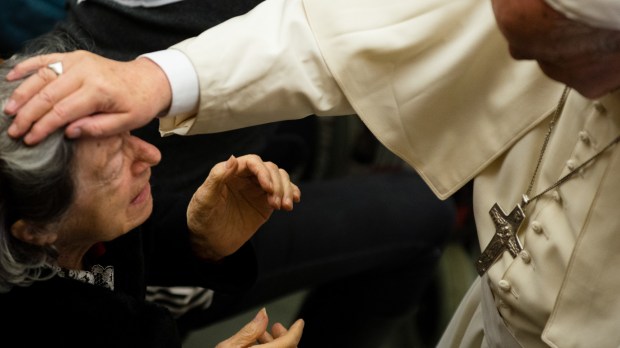In an address today to members of the World Medical Association, Pope Francis highlighted the importance of recognizing that not every treatment available to the sick and dying is a treatment that should be administered.
The pope’s address took up the crucial issue of evaluating the “integral good of the person” when faced with medical decisions. At the same time, he warned against the temptation to keep patients at a distance as they near the end of life, due to the “anguish” and “difficulty” implied in these circumstances.
“It could be said that the categorical imperative is to never abandon the sick,” Francis stated. “[…] we are called to show love and closeness, recognizing the limit that we all share and showing our solidarity. Let each of us give love in his or her own way—as a father, a mother, a son, a daughter, a brother or sister, a doctor or a nurse. But give it!”
The pope made a careful distinction between promoting health and extending life, saying that with the progression of technology, “greater wisdom is called for today.”
It has “become possible nowadays to extend life by means that were inconceivable in the past,” he said. “Surgery and other medical interventions have become ever more effective, but they are not always beneficial: they can sustain, or even replace, failing vital functions, but that is not the same as promoting health.”
He said it’s a temptation to “insist on treatments that have powerful effects on the body, yet at times do not serve the integral good of the person.”

Read more:
Does the Church expect us to suffer instead of “dying with dignity”?
Referring to an explanation already from Pius XII some 60 years ago, Francis underlined that “there is no obligation to have recourse in all circumstances to every possible remedy and that, in some specific cases, it is permissible to refrain from their use.”
To make these determinations, the standard of “due proportion in the use of remedies” was laid out.
“The specific element of this criterion is that it considers ‘the result that can be expected, taking into account the state of the sick person and his or her physical and moral resources.’ It thus makes possible a decision that is morally qualified as withdrawal of ‘overzealous treatment.’”
Accepting the limitations of mortality, while never willing to cause death, “restores humanity to the accompaniment of the dying, while not attempting to justify the suppression of the living,” he said.
“It is clear that not adopting, or else suspending, disproportionate measures, means avoiding overzealous treatment; from an ethical standpoint, it is completely different from euthanasia, which is always wrong, in that the intent of euthanasia is to end life and cause death.”
Francis acknowledged that applying these principles in concrete circumstances is a delicate matter, and emphasized that priority is given to the will of the patient, whenever he or she is able to make decisions.
But he also spoke of a “supreme commandment of responsible closeness,” that must be kept “uppermost in mind, as we see clearly from the Gospel story of the Good Samaritan.”
“And even if we know that we cannot always guarantee healing or a cure, we can and must always care for the living, without ourselves shortening their life, but also without futilely resisting their death. This approach is reflected in palliative care, which is proving most important in our culture, as it opposes what makes death most terrifying and unwelcome—pain and loneliness.”

